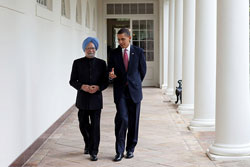US-India research collaborations celebrated
November - December, 2009 | Volume 8, Issue 6

White House photo by Pete Souza
Indian Prime Minister Singh and U.S. President
Obama reaffirmed their commitment to
strengthen US-India research collaborations
during the recent state visit.
U.S.-India research collaborations were celebrated at a number of events this fall, including a state visit by Indian Prime Minister Manmohan Singh and a number of high-level gatherings on the NIH campus.
During their talks, Prime Minister Singh and President Barack Obama reaffirmed their countries' strong commitment to advancing public health and biomedical research and programming collaborations.
In addition to extensive ongoing India-U.S. partnerships in the public health and scientific sector, the White House released a communiqué describing these new developments:
Medical Research: Noting a fifty-year history of bilateral innovation and discovery in the medical research field, President Obama and Prime Minister Singh agreed to enhance collaborative biomedical, public health and translational research focused on infectious and aging-related chronic diseases, maternal and child health, and family planning, while also strengthening health research capacity and the translation of scientific discoveries into life-saving practices of global benefit.
Global Disease Detection Program: The leaders announced India as the seventh regional center in the Global Disease Detection (GDD) network. GDD activities include collaboration on emerging disease detection and response, pandemic influenza preparedness and response, laboratory systems and biosafety, field epidemiology training, health communications, and zoonotic disease investigation and control.
Polio Eradication: India recently developed a bivalent polio vaccine which has potential application in all polio-infected countries.
Cooperation on Urban Health: The U.S. Agency for International Development will soon launch its new Health of the Urban Poor Program, which aims to improve reproductive and child health in urban poor populations, especially for those dwelling in slums, by building the local capacity, improving program implementation and increasing resource allocation for urban health through policy analysis. The program will work in close collaboration with urban local bodies and Indian national and state governments.
Health Services and Regulatory Harmonization: The U.S. and India will continue to collaborate on activities that enhance healthcare, including concrete programs for biomedical technical exchanges, fostering regulatory harmonization and sharing best practices in technology transfer. The U.S.-India High-Technology Cooperation Group's Working Group on Biotechnology and Life Sciences anticipates expanded work on these topics and promotion of institutional linkages, including a workshop on medical technology regulations in India during early 2010 and at the Biotechnology Industry Organization's 2010 international convention.
Status of Health Dialogue: The first meeting of the U.S.-India Health Dialogue is planned for early 2010 in Washington. Secretary of Health and Human Services Sebelius is the U.S. lead and Minister of Health and Family Welfare Azad will lead for India.
More Information
To view Adobe PDF files,
download current, free accessible plug-ins from Adobe's website.